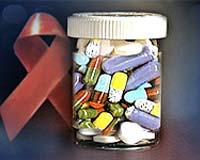 |
Washington (AFP) May 12, 2011 People with HIV who take antiretroviral drugs before their health declines have a 96 percent lower risk of transmitting the virus to a partner, a breakthrough global study released Thursday said. The large study that covered mainly heterosexual couples in Africa, India and the Americas was hailed by AIDS experts as a "game-changer" that will transform how the disease is managed, 30 years after it first surfaced. Until now, antiretroviral therapy was known to improve the health of people infected with human immunodeficiency virus, but this is the first study to show a solid impact on preventing transmission to an HIV-negative partner. "This is excellent news," said Myron Cohen, lead investigator on the study and director of the Institute of Global Health and Infectious Diseases at the University of North Carolina at Chapel Hill. "This is the first randomized clinical trial to definitively indicate that an HIV-infected individual can reduce sexual transmission of HIV to an uninfected partner by beginning antiretroviral therapy sooner." The trial began in 2005 and included 1,763 couples -- 97 percent of whom were heterosexual -- and was carried out at 13 sites in countries including Brazil, Thailand, Zimbabwe, India and South Africa. The HIV-infected partners included 890 men and 873 women. The randomization phase was halted early once researchers realized that the drug regimen was having such a significant blocking effect on the risk of spreading the infection, which afflicts 33 million people worldwide. Some couples were placed into a delayed group, in which the infected partner began taking antiretroviral therapy (ART) only when a type of T-cell known as CD4 dipped below 250 cells per millimeter cubed, or if he or she developed an AIDS-related illness. The other group began taking ART immediately. In that group, just one case of HIV transmission was observed. There were 27 HIV transmissions in the delayed group that could be traced directly to the infected partner, a difference the study described as "highly statistically significant." National Institute of Allergy and Infectious Diseases chief Anthony Fauci hailed the findings. "Previous data about the potential value of antiretrovirals in making HIV-infected individuals less infectious to their sexual partners came largely from observational and epidemiological studies," said Fauci. "This new finding convincingly demonstrates that treating the infected individual -- and doing so sooner rather than later -- can have a major impact on reducing HIV transmission." According to Wafaa el-Sadr, a member of the executive committee of the HIV Prevention Trials Network (HPTN), the group that did this study, the results should have a major impact on treatment guidelines. "I think HPTN 052 will always be recognized as a landmark study that truly may transform treatment as well as prevention of HIV globally," she told AFP. Sadr, who is also a professor of medicine and epidemiology at Columbia University in New York, said the couples in the study would continue to be followed. "Everybody who was not offered immediate treatment is now being offered immediate treatment, now that we know what we know," she said. The study was initially set to continue until 2015 but the independent safety and monitoring board halted the randomization phase early "because of the very clear and remarkable benefits that were shown," she said. "They determined that these findings were so profoundly important that they had to be shared immediately," she said. Executive Director of the Joint United Nations Program on HIV/AIDS (UNAIDS), Michel Sidibe, described the study as "a game-changer" that "will drive the prevention revolution forward." AIDS has claimed more than 25 million lives and more than 60 million people have become infected with the human immunodeficiency virus (HIV) since the first deaths from the disease were recorded in 1981. Around 80 percent of new infections occur through sex, according to UN figures. Antiretroviral treatment, first devised in the 1990s, is a combination of drugs that can reduce the level of virus in the blood to below detectable levels. But it can also have distressing side-effects such as diarrhea, nausea, vomiting and weight loss. Designed primarily as a treatment, antiretrovirals are now being tested for prevention, as a pill taken by gay men at risk of unsafe sex and as a vaginal gel for women. Early data from these trials is encouraging.
Share This Article With Planet Earth
Related Links Epidemics on Earth - Bird Flu, HIV/AIDS, Ebola
 Drugs study hailed as watershed in AIDS saga
Drugs study hailed as watershed in AIDS sagaParis (AFP) May 12, 2011 Health campaigners said on Thursday a new front had opened in the three-decade war on AIDS after a study among couples showed early use of drugs slashed the risk of HIV infection through sex by 96 percent. "It's a game-changer," Michel Sidibe, executive director of UNAIDS, said in an interview with AFP. "I am completely amazed." Antiretroviral drugs can deliver a double blow by suppressi ... read more |
|
| The content herein, unless otherwise known to be public domain, are Copyright 1995-2010 - SpaceDaily. AFP and UPI Wire Stories are copyright Agence France-Presse and United Press International. ESA Portal Reports are copyright European Space Agency. All NASA sourced material is public domain. Additional copyrights may apply in whole or part to other bona fide parties. Advertising does not imply endorsement,agreement or approval of any opinions, statements or information provided by SpaceDaily on any Web page published or hosted by SpaceDaily. Privacy Statement |